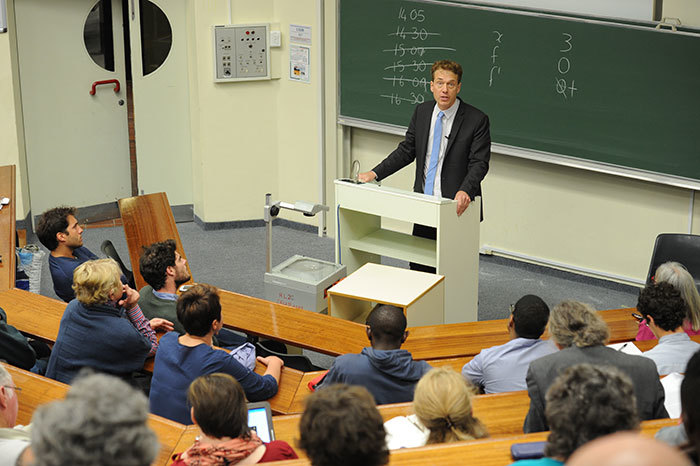Harvard professor highlights the violent roots of capitalism
17 November 2014 | Story by Newsroom
Professor Sven Beckert, Harvard's Laird Bell Professor of History, recently turned fundamental assumptions about capitalism upside down, using the term "war capitalism" in reference to the inherent violence of early capitalism.
Beckert expounded on the global history of capitalism to an audience of over 120 graduates, alumni and friends of UCT during a visit to the university's Department of Historical Studies, during which he ran a week-long workshop for graduate students of economic history and related fields.
In his lecture he identified cotton as a commodity at the heart of global capitalism. Cotton "depended on plantation and factory, slavery and wage labour, colonisers and colonised, railroads and steamships – in short, on a global network of land, labour, transport, manufacture, and sale. It also required the expansion and creation of institutions for the transfer of capital across the globe and the creation of new commodity markets," he explained.
Beckert's book on the subject, titled Empire of Cotton, was published this year.
Beckert argued that cotton exemplifies how early forms of capitalism depended not on free wage labour, but on slavery and other unfree forms of labour. His argument that slavery shaped the structure and development of capitalist relations of work has far-reaching implications for our understanding of the history of capitalism, and calls into question key assumptions on which the discipline of sociology has rested.
By following links between imperial expansion, expropriation and slavery in the making of the empire of cotton, Beckert demonstrated how states backed merchant, settler and manufacturing ventures in ways that supported and perpetrated violence; in his book, he coins the term "war capitalism" to convey the inherent violence of early cotton capitalism.
He also highlighted how states engaged in underwriting the way cotton was grown, transported, financed, manufactured and sold, making it very clear that markets did not emerge or function independently of state support.
Photo by Michael Hammond.
 This work is licensed under a Creative Commons Attribution-NoDerivatives 4.0 International License.
This work is licensed under a Creative Commons Attribution-NoDerivatives 4.0 International License.
Please view the republishing articles page for more information.










